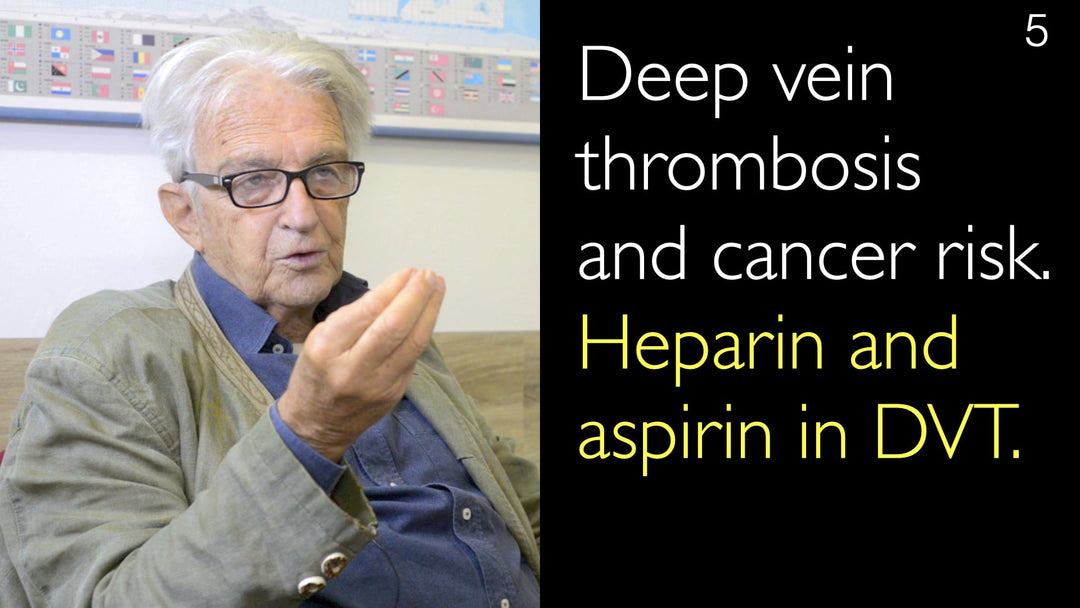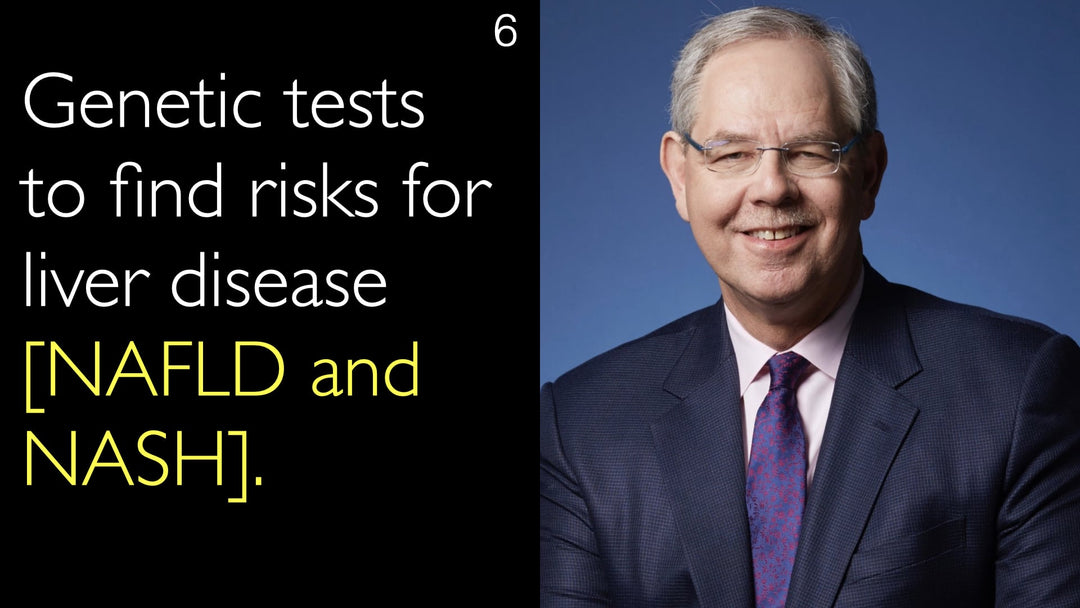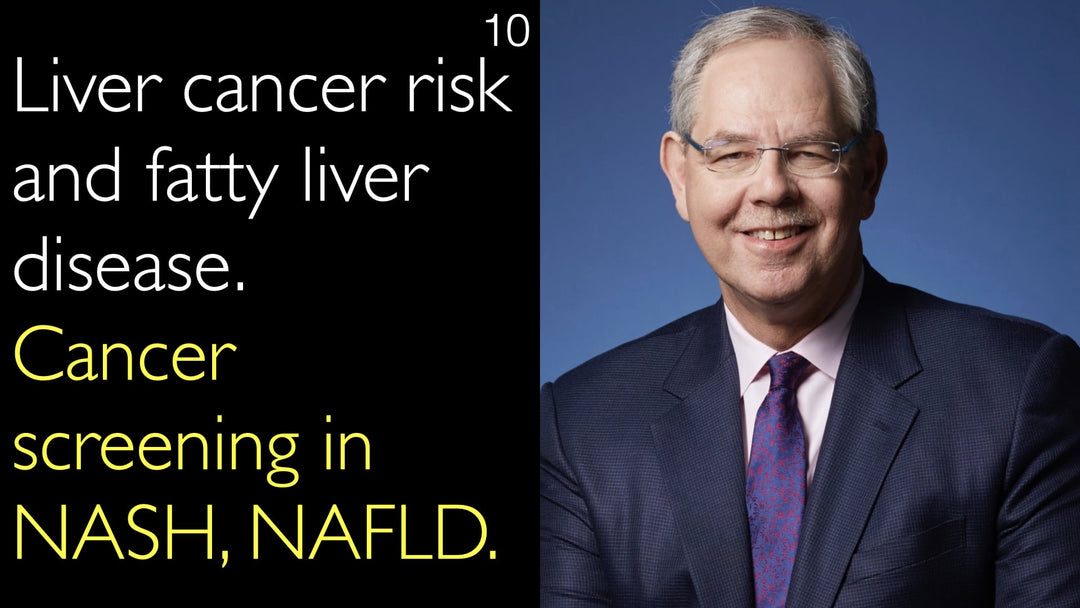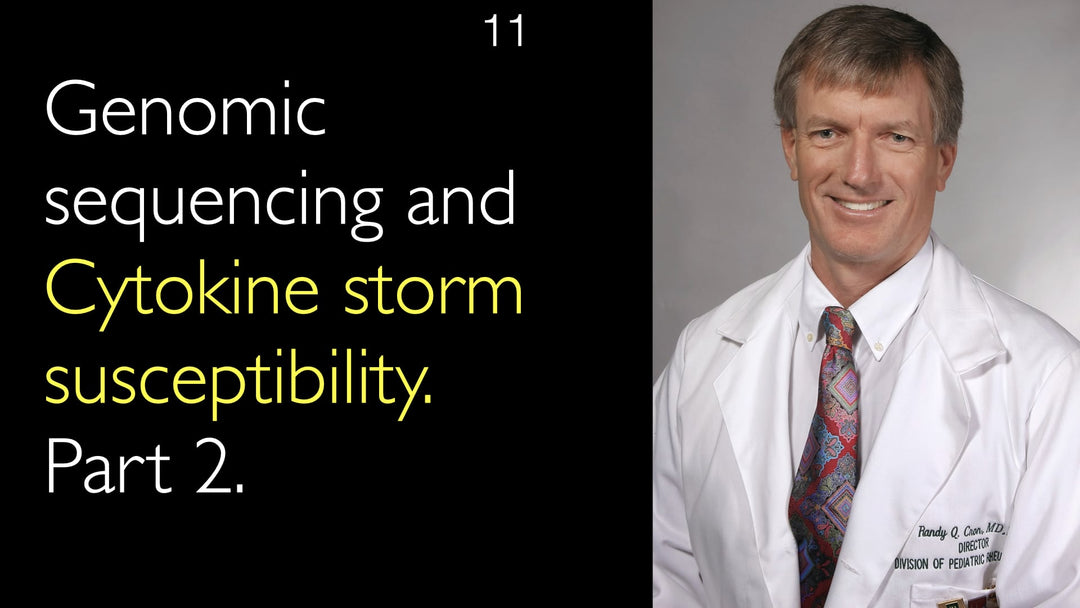Leading expert in thrombosis and hemostasis, Dr. Pier Mannucci, MD, explains the complex relationship between cancer and blood clots. He details the use of low molecular weight heparin and direct oral anticoagulants for thrombosis prevention and treatment in cancer patients. Dr. Mannucci clarifies that while deep vein thrombosis can be an early cancer sign, extensive screening is not recommended. He also discusses the limited role of anticoagulants in cancer therapy and the more promising data for aspirin in cancer prevention.
Cancer, Blood Clots, and Anticoagulant Therapy: A Comprehensive Guide
Jump To Section
- The Cancer and Thrombosis Link
- Anticoagulant Treatment Options
- DVT as a Cancer Screening Signal
- Anticoagulants in Cancer Therapy
- Aspirin in Cancer Prevention
- Clinical Recommendations and Conclusions
- Full Transcript
The Cancer and Thrombosis Link
Cancer is a major and powerful risk factor for developing venous thrombosis, particularly deep vein thrombosis (DVT). Dr. Pier Mannucci, MD, emphasizes that this risk is significantly heightened during active phases of cancer treatment, including chemotherapy and surgery. Certain cancer types, such as pancreatic cancer and cancers of the gastrointestinal (GI) tract, carry an especially high thrombosis risk. The hypercoagulable state associated with malignancy means that proactive measures are essential for patient safety.
Anticoagulant Treatment Options
For both preventing and treating blood clots in cancer patients, anticoagulant therapy is the standard of care. Dr. Pier Mannucci, MD, identifies low molecular weight heparin (LMWH) and direct oral anticoagulants (DOACs) as the primary treatment choices. He notes that while DOACs offer the convenience of oral administration, the evidence does not solidly show they are superior to LMWH. LMWH has a long-established record as the best weapon for managing thrombosis in this vulnerable population, who may be thrombocytopenic or frail from chemotherapy.
DVT as a Cancer Screening Signal
A diagnosis of deep vein thrombosis can sometimes be the first clinical sign of an underlying occult cancer. During his discussion with Dr. Anton Titov, MD, Dr. Mannucci acknowledges this clinical reality. However, he presents a crucial evidence-based counterpoint: extensive cancer screening in patients with an unprovoked DVT but no other symptoms is generally not recommended. Such broad screening has been shown to be not cost-effective and, most importantly, does not alter the eventual course of any cancer that is discovered.
Anticoagulants in Cancer Therapy
The concept of using anticoagulants like heparin to treat cancer itself or prevent its metastasis has been explored. Dr. Pier Mannucci, MD, provides a clear assessment of this idea, stating that while early experimental data was promising, clinical studies in humans have been quite disappointing. He clarifies that anticoagulants are administered to cancer patients specifically to prevent thrombotic complications, not to control the cancer's dissemination or progression. Using them for direct anti-cancer therapy often causes more problems than it aims to prevent.
Aspirin in Cancer Prevention
The conversation with Dr. Anton Titov, MD, then turns to aspirin, an antiplatelet agent. Dr. Pier Mannucci, MD, highlights a more promising area of research: aspirin's potential role in cancer prevention. Large observational studies on thousands of people taking low-dose aspirin for cardiovascular prevention noted a lower incidence of cancer, particularly colorectal cancer and bladder cancer. The proposed mechanism involves aspirin preventing the formation of protective "cocoons" around metastasizing cancer cells. Ongoing clinical trials are specifically investigating this potential benefit.
Clinical Recommendations and Conclusions
Dr. Pier Mannucci, MD, concludes with practical clinical guidance. He stresses that the decision to use any medication, including aspirin for potential cancer prevention, must be based on a clear primary indication due to the risk of side effects. For example, aspirin is justified for primary or secondary prevention of cardiovascular events, with any cancer risk reduction being a potential secondary benefit. The interview with Dr. Anton Titov, MD, provides a nuanced overview, separating proven anticoagulant uses in thrombosis management from the more speculative, though intriguing, areas of direct cancer therapy and prevention.
Full Transcript
Dr. Anton Titov, MD: Cancer and increased blood clot formation in veins sometimes coexist. Deep vein thrombosis, or DVT, can be the first sign of cancer's presence in the body. Low molecular weight fractionated heparin has been used to prevent blood clot-related complications in patients already diagnosed with cancer. But low molecular weight heparin might also have a preventive and protective role from cancer formation and especially from cancer metastasis. How might low molecular weight heparin and other anti-thrombotic medications reduce cancer risks and death from cancer?
Dr. Pier Mannucci, MD: Cancer is a known risk factor for thrombosis, particularly venous thrombosis. Cancer is a solid risk factor, much stronger than those I mentioned before. Thrombosis is a risk, particularly during the active phase of chemotherapy and for certain types of cancer—cancers of the GI tract, pancreatic cancer. But in any cancer, particularly during chemotherapy and surgery, prophylaxis with low molecular weight heparin or with new direct oral anticoagulants is important.
We will mention that later. As much as heparin is concerned, together with direct oral anticoagulants, it is a treatment of choice. The use of low molecular weight heparin and direct oral anticoagulants (DOACs) is the treatment of choice. Some patients, despite this precaution, develop thrombosis in cancer.
It has been shown that compared with vitamin K antagonists, the risk of bleeding exists in patients who undergo chemotherapy. They are sometimes thrombocytopenic or frail. It has been demonstrated that low molecular weight heparin is the best weapon to prevent and treat thrombosis.
It is debatable, even though recently it has been shown that direct oral anticoagulants are equivalent to low molecular weight heparin. I don't think there's solid evidence that DOACs (NOACs) are superior. But direct oral anticoagulants have the advantage: you don't have to puncture your belly frequently. So there are some advantages of direct oral anticoagulants.
People are convinced they are slightly superior. This is what I think from the point of view of prevention of thrombosis in patients with cancer. It is also for the treatment of thrombosis in those who have cancer and develop thrombosis.
You also mentioned briefly the issue of whether thrombosis can be the first early sign of the presence of cancer. This is a very controversial issue. It is true, based on my clinical experience, that sometimes a suspicion for cancer was aroused by the presence of thrombosis.
But it has been shown that an extensive screening and search for cancer in patients who have no cancer already diagnosed but who develop thrombosis is probably not worthy. Of course, if I added thrombosis to the fact that I may have a stronger risk factor for cancer, which is my age, I would have worried. But I would not have undergone a broad extensive screening for cancer because it has been shown that the screening is not cost-effective in picking up cancer.
Most importantly, screening for cancer after thrombosis finding doesn't affect the course of cancer that will eventually develop. So that is the message.
Another thing you discussed in your introduction is whether low molecular weight heparin or other anticoagulants are effective in the treatment of cancer. There are experimental data that show that inhibiting coagulation and thrombosis may help to avoid the metastasis of cancer, particularly the occurrence of metastasis.
I can tell you that to my knowledge, it is not my cup of tea in terms of my publications. But I think I know quite well the medical literature on this topic. I don't think that there is an attempt to give an anticoagulant, including low molecular weight heparin or unfractionated heparin, to prevent cancer.
If anything, these drugs are given for prophylaxis of thrombosis, but not to control the metastasis and elimination of cancer in patients who have already developed cancer. From that point of view, the experimental data for therapy of cancer with anticoagulants that were quite promising have been quite disappointing.
I'm not sure that this opinion will be shared by everybody. But what I can tell you for sure is that I don't know of any better treatment of cancer than with the multiple drugs, surgery, or radiotherapy that also encompasses the use of anticoagulants. If anticoagulants are given in those situations, they can prevent thrombosis. Anticoagulants are not given to prevent the dissemination of cancer.
That is my candid opinion on this very crucial topic. Of course, there were a lot of expectations, but I think that the clinical studies in humans can be quite disappointing. Anticoagulants often caused more problems than they wanted to prevent.
Aspirin, part of the antiplatelet effect of aspirin, has some data that shows it might prevent the formation of kind of cocoons around the metastasizing cancer cells. There are some statistics in the studies of aspirin that might show there is a little bit less metastasis in people with an already established cancer diagnosis. But of course, it's speculation.
Dr. Anton Titov, MD: Thank you. You mentioned the story of aspirin. That is a little bit different too, because we are dealing with an antiplatelet agent, not with an anticoagulant.
Dr. Pier Mannucci, MD: That story of aspirin in cancer is more significant and promising, even though it is not yet consolidated. Many people take aspirin for any reason, primary or secondary prevention of cardiovascular disease. There are two huge studies done on thousands and thousands of people.
It has been observed that for those people who regularly took aspirin for primary or secondary prevention, there was a lower incidence of cancer. So it is the incidence, the occurrence of cancer, particularly of the digestive tract, especially cancer of the colon. But cancer incidence was lower also in the digestive tract and other organs, particularly the urinary bladder.
These are promising data. Now there are clinical studies that are ongoing and want to specifically tackle this issue. I haven't seen them published yet. But certainly, if it is necessary for other reasons, taking a low-dose aspirin a day might help prevent the onset of cancer, particularly cancers of the gastrointestinal tract.
I think it is rather promising. However, to tell you the truth, I would not give a drug that has some side effects unless there is another indication to take it. So aspirin is indicated as primary prevention in people with a risk of thrombosis because of other risk factors, particularly for venous thrombosis, or as secondary prevention in people who have already developed a stroke or coronary artery disease. This is my personal opinion.







